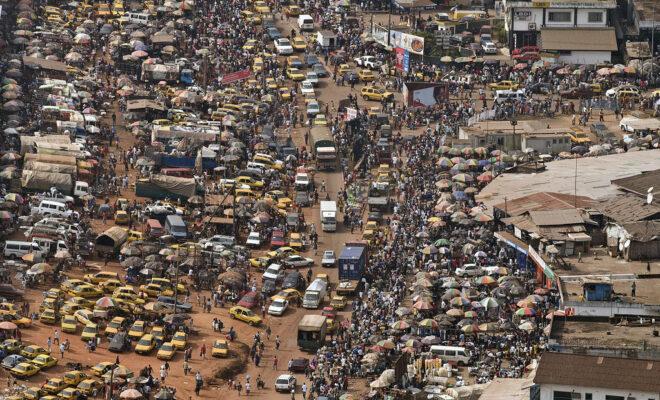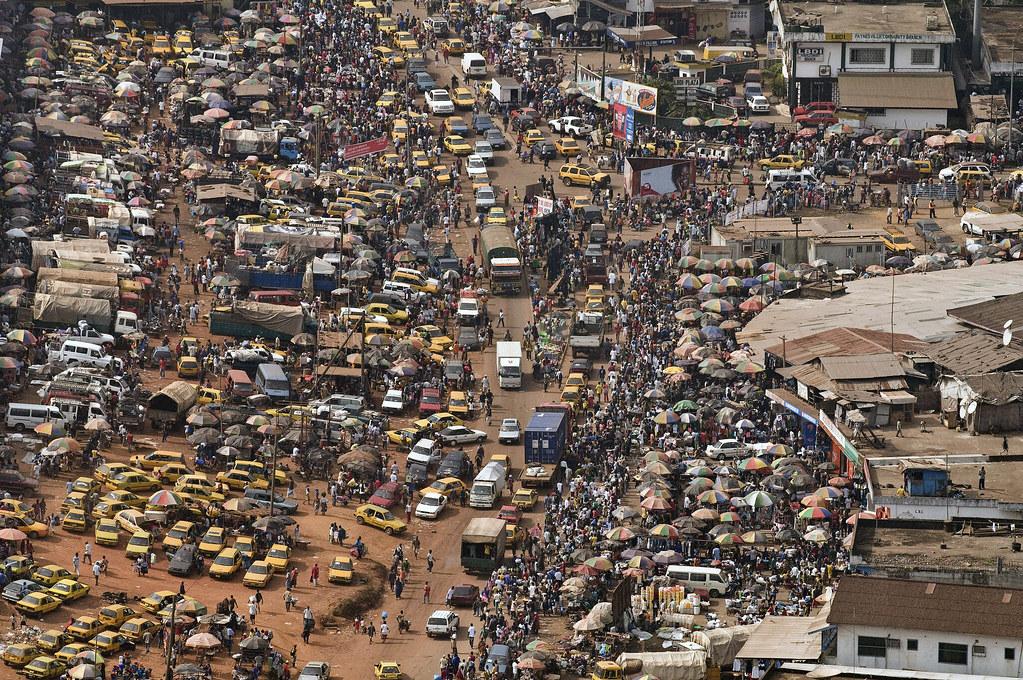“Not the change we voted for”: Liberia awaits more protests as anger rises

Following the 7 June protests, the organisers gave President Weah a one-month ultimatum to act. That deadline is fast-approaching.

An aerial view of Monrovia, Liberia, which saw thousands of people take to the streets to protest earlier this month. Credit: UN Photo/Christopher Herwig.
It has now been almost three weeks since Liberia witnessed its biggest anti-government protests since the end of civil war in 2003.
In a mass action on 7 June, thousands of people took the streets to express their frustration at poverty, rising inflation, and corruption under President George Weah. In the capital Monrovia, huge numbers of opposition supporters, student and youth groups, market traders and lawmakers congregated outside Capitol Hill where they danced, sang anti-government songs and waved placards.
The government deployed anti-riot police and successfully pressured two leading telecoms companies – Orange and Lonestar Cell MTN – to restrict access to social media sites. But protesters were undeterred and determined to make their voices heard.
“This is not the change we voted for,” proclaimed 42-year-old Emmanuel Dolo, complaining of the rising cost of living since President Weah came to office in January 2018. “How can we live under these kinds of harsh circumstances?”
“We have a president who is building mansions and living in luxury, but he has refused to publish his assets”, added mother-of-three Mary Sampson , 37, complaining of corruption allegations. “Where is he taking all the money from to build his private homes when we don’t even have drugs at our hospitals?”
The day after the protest, the organisers released a lengthy list of demands. Among other things, they called on the president to fire his finance minister and central bank governor for their alleged role in graft. They urged him to dissolve the government’s Technical Economic Management Team. And they demanded that Weah publish his assets, stop using private jets, and establish a war and economic crimes court.
They gave the government a one-month ultimatum to act, the deadline of which is fast-approaching.
How did we get here?
President Weah came to power after winning the 2017 elections on a wave of hope. He was seen as a clean pair of hands and promised to boost the economy, create jobs and tackle corruption. 18 months into his presidency, much of that early optimism has turned to disappointment.
The cost of living has continued to rise in a country where most people live on less that $2 a day and unemployment remains high. On 31 May, the International Monetary Fund (IMF) revised Liberia’s projected growth rate for 2019 down from 4.7% to just 0.4%, while inflation has climbed to as high as 23.3%. Some hospitals have reportedly run out of essential drugs, with some on the brink of collapse. Several of the huge infrastructure projects Weah promised would transform the economy are still yet to begin.
That’s not to say, however, that the president has been idle. Since taking office, Weah has completed a private state-of-the-art complex of condominiums and refurbished several of his old homes. He has travelled widely in his private jet.
There have also been a number of corruption scandals under his watch. The most prominent involves Minister of Finance Samuel Tweh and Central Bank Governor Nathaniel Patray, who are accused of overseeing the disappearance of around $2 million. Weah’s critics have also accused him of trying to stifle freedom of expression after he proclaimed in a speech earlier this month: “If you think you can insult this President and walk in the street freely, it will not happen.”
For many Liberians now, enough is enough. They believe Weah has let the country down and are demanding widespread change.
Weah’s response
In response to rising popular frustration, the president has publicly acknowledged Liberia’s economic woes. “I am aware of the difficulties and hardships that the rising exchange rate is causing you, and the effect it is having on prices of all goods and commodities in the market,” he said in a televised address this May. “I am deeply concerned about these issues, and I am working day and night to resolve them.”
He has also promised some action. The president has said he will reduce the country’s reliance on the extractive industries by focusing on developing agriculture, for example, and suggested cutting government salaries to reduce the national spending budget. He also endorsed an IMF programme in May, which he said would help “stabilise our economy, restore confidence in our currency, and offer technical assistance to continue social services”.
In response to scandals, Weah asked Liberia’s anti-corruption commission to investigate the case regarding Tweh and Patray, though the inquiry has not been given a deadline, and ordered the Justice Ministry to review audit reports of the previous government. Weah’s administration has said that any ex-officials implicated in wrongdoing will have to option of either returning stolen funds or facing prosecution.
This was not enough, however, to assuage protesters on 7 June. They demand Weah publish his assets and fire Tweh and Patray. Many also want to economic changes go much further. “Improving the economy without making structural changes will leave the citizens as slaves trapped in bondage in their own country,” says Torli Krua, executive director of the NGO Universal Human Rights International (UHRI).
A few days after the protests, Weah struck a conciliatory tone in his nationwide address and called for dialogue to gather ideas. The Council of Patriots, which organised the 7 June protests, welcomed the invitation but demanded the president fire Tweh and Patray ahead of any talks. They said their ideas cannot be implemented by incompetent and corrupt officials.
Without this precondition being met, these talks have not been had and more anti-government protests are being planned. Patience with President Weah is wearing thin.
“As long as the president does not act on our demands, we will continue to protest,” says Henry Costa, the lead protest organiser.
“We are tired of selling in the market and not making any profit,” adds Sarah Johnson, 27. “I just want to tell George Weah that if he is not able to manage this country he should step down.”






Things will be not be easy. Because we the Liberians hit each other. All we need in that country is peace and justice loving each other, no phobia act. We can have to do is to keep on praying for the best to come in ours country. We have to work together as a team. Because when others are cleaning the dert, others too are on the side porting backers the dert, is not good to be honest.
MEDICINE AFTER DEATH.
What are they protesting, could anyone protest his own irrational missteps based on stupid SENTIMENTS?.
The black mentality stinks and reasons we are still in the woods and may never get out of it.
Liberians ignored proven record for infertile impotence and unproven character. They chose a footballer without either administrative resume and or managerial experience over experience and attributable performance.
When a people become their own albatross and sources of woes and miseries. Thy will forever remain enmeshed and mired in self inflicted misfortunes miseries woes and architects of own backwardness.
My earlier summations and projections on the Liberian elections and choice of leadership refers. Where i enumerated the case against the political minion and managerial mediocre called George Weah.
BLACK MAN BLACK SENSE. YOUR MISERABLE LIVING CONTINUES UNTIL YOU SUMMON CAPABILITY FOR RATIONAL THOUGHTS.
A PEOPLE’S DESTINY SHOULD NOT BE DETERMINED BY MERE SENTIMENT.
anti-malaria drug chloroquine https://chloroquineorigin.com/# hydroxychloroquine sulfate 200 mg tab
cialis coupon https://cialiswithdapoxetine.com/